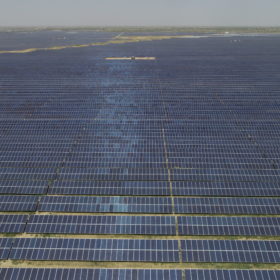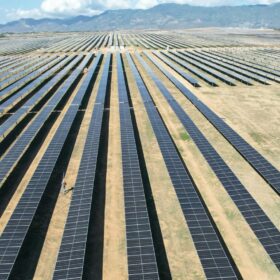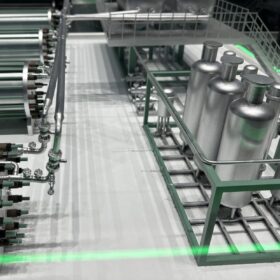Dr Vibha Dhawan, Director General, TERI, observed that ‘green growth’ being a priority area in the Union Budget is reflective of the efforts undertaken across sectors to achieve the net-zero targets set for 2070. “The outlay of Rs 19,700 crores for the National Green Hydrogen Mission and the annual production target of 5MMT by 2030 will serve as an impetus to the decarbonization process and reduce the dependence on fossil fuels. So is the provision of Rs 35,000 crores for priority capital investment towards energy transition and net-zero objectives,” said Dr Dhawan.
Observing that the focus on sustainable development cutting across sectors and areas is encouraging, she added, “The Green Credit Programme, which according to the Finance Minister will be notified under the Environment Protection Act, can encourage behavioural change and incentivize environmentally sustainable actions by companies, individuals and local bodies.”
Measures such as enhanced focus on scientific waste management and allocation of funds to scrap old, polluting vehicles at the Central and State levels are welcome steps to make the urban landscape as well as the transport sector cleaner, she said. “The focus on circular economy, biodiversity conservation and restoration, and sustainable agriculture are critical to achieving the 2030 and 2070 goals, while the stress on green mobility and green buildings are critical to making urban infrastructure sustainable,” Dr Dhawan added.
Noting that green investments have received a major push in the Union Budget, Mr RR Rashmi, Distinguished Fellow, TERI, said, “There are several initiatives that will help us achieve not only our short term NDCs, but also move towards the goal of net-zero emissions in the long run.”
With nearly Rs 85,000 crores earmarked for green transformation, including the 13 GW transmission line from Ladakh, 4,000 MWH battery storage capacity, promotion of pumped storage, support to one crore farmers for natural farming, Mr Rashmi called it “a big bang budget” for the future greening of the economy. He also pointed out the ambitious push for biogas through the GOBARdhan scheme.
Dr SK Sarkar, Distinguished Fellow, TERI, underscored the significance of the wetland ecosystem restoration efforts announced in the Union Budget. “It is a vital instrument for improved environmental management. The Finance Minister announced a three-year scheme for optimal use of wetlands in the country. Under UN Sustainable Development Goals (SDG) 6, a country is required to protect and restore water related ecosystems including mountains, forests, wetlands, rivers, aquifers and lakes. The Finance Minister only mentioned wetlands in this regard; the other aspects of water related ecosystems such as river aquifers, lakes did not find a mention in the Union Budget,” he added.
He also noted that the focus on inclusive development, economic empowerment of women, and good governance in the Union Budget will positively impact the sustainable water resource management measures. “The Jal Jeevan Mission Programme of the Central government, for instance, needs urgent commitment of women for programme implementation. Empowering them is necessary,” he added.
Observing that several of the announcements in the Union Budget will help in decarbonization, especially of the transport sector, Mr Shri Prakash, Distinguished Fellow, TERI, said, “Substantial increase in the investment in Railways, which is the most environment friendly mode of transport, is a welcome step. It is in line with our NDCs of enhancing railway’s share to 45 per cent (from 36 per cent in 2015) for mitigation of carbon emission from freight transport.”
Mr Prakash noted that initiatives such as tax concessions to encourage manufacture of lithium-ion batteries and making electric vehicles cheaper are in the right direction. “This step will also work as a catalyst for rapid expansion of electrification of motor vehicles with twin advantage — reduction in air pollution in the cities and carbon emission mitigation,” he added.
On the scheme of Mangrove Initiative for Shoreline Habitats & Tangible Incomes (MISHTI) announced in the Union Budget, Dr JV Sharma, Senior Director, TERI, said, “Investors can also fund mangrove plantations by sharing carbon credits generated through these plantations on a 50:50 basis.” He also noted that forest communities could be benefitted for their conservation efforts through REDD+ projects.
Calling the Budget ‘green’ and ‘inclusive’, Ms Suruchi Bhadwal, Senior Fellow and Director, TERI, said, “Increase in Capex focuses on macroeconomic stability and boosting investment in infrastructure.” She pointed out that the Budget also addresses ‘inclusivity’ through the continuation of free food disbursement schemes to underprivileged households, focus on women empowerment, support to farmers, and formation of the PM-PVTG (Particularly Vulnerable Tribal Groups) Development Mission. “Measures such as the Agriculture Accelerator Fund announced for start-ups in agriculture, support with modern technologies, and an increase in decentralised storage capacities are all aimed to build the resilience of farmers,” she added.
The Union Budget has provided an impetus for better and sustainable utilization of animal and organic manure for generation of biogas, said Mr Souvik Bhattacharjya, Associate Director, TERI. “This has twin benefits. It pushes for a circular economy, while moving towards cleaner and secure energy sources. There is also the emphasis on its application in automobiles with 200 compressed biogas plants set to come up, of which 75 will be in urban areas. The measure will address the fuel requirement issue in the mobility sector in the urban and rural areas,” he observed. Mr Bhattacharjya said the 5% Compressed Bio Gas mandate for organizations marketing biogas is a welcome measure.
Drawing attention to the push given to coastal shipping in the Union Budget, Mr Bhattacharjya said it will boost the shipping industry and is in alignment with the goals of India’s Blue Economy Policy.
Dr Shailly Kedia, Associate Director, TERI, highlighted that future Union Budgets can be aligned with the SDGs especially for areas such as sustainable consumption, ocean action and climate adaptation. “Statement 12 and Statement 13 in the Union Budget are on Gender Budget and Child Budgeting respectively. To give further impetus on environmental goals and equity, Union budgeting should include Green Budgeting as the third pillar of issue-based budgeting processes,” she added.
About TERI
The Energy and Resources Institute (TERI), based in India, is an independent, multi- dimensional research organization with capabilities in policy research, technology development, and implementation. An innovator and agent of change in the energy, environment, climate change and sustainability space, TERI has pioneered conversations and action in these areas for nearly five decades. Headquartered in New Delhi, it has centres in six Indian cities, and is supported by a multi-disciplinary team of scientists, sociologists, economists, engineers, administrative professional and state-of-the-art infrastructure.





